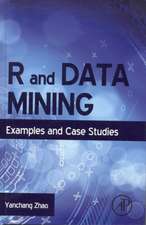Strategies for Quasi-Monte Carlo: International Series in Operations Research & Management Science, cartea 22
Autor Bennett L. Foxen Limba Engleză Hardback – 31 aug 1999
This monograph has been designed to appeal to a diverse audience, including those with applications in queueing, operations research, computational finance, mathematical programming, partial differential equations (both deterministic and stochastic), and particle transport, as well as to probabilists and statisticians wanting to know how to apply effectively a powerful tool, and to those interested in numerical integration or optimization in their own right. It recognizes that the heart of practical application is algorithms, so pseudocodes appear throughout the book. While not primarily a textbook, it is suitable as a supplementary text for certain graduate courses. As a reference, it belongs on the shelf of everyone with a serious interest in improving simulation efficiency. Moreover, it will be a valuable reference to all those individuals interested in improving simulation efficiency with more than incremental increases.
| Toate formatele și edițiile | Preț | Express |
|---|---|---|
| Paperback (1) | 992.44 lei 6-8 săpt. | |
| Springer Us – 12 oct 2012 | 992.44 lei 6-8 săpt. | |
| Hardback (1) | 1000.70 lei 6-8 săpt. | |
| Springer Us – 31 aug 1999 | 1000.70 lei 6-8 săpt. |
Din seria International Series in Operations Research & Management Science
- 20%
 Preț: 331.25 lei
Preț: 331.25 lei - 9%
 Preț: 696.06 lei
Preț: 696.06 lei - 20%
 Preț: 570.62 lei
Preț: 570.62 lei - 18%
 Preț: 1132.02 lei
Preț: 1132.02 lei - 18%
 Preț: 773.72 lei
Preț: 773.72 lei -
 Preț: 170.40 lei
Preț: 170.40 lei - 17%
 Preț: 459.35 lei
Preț: 459.35 lei - 17%
 Preț: 360.48 lei
Preț: 360.48 lei -
 Preț: 263.40 lei
Preț: 263.40 lei - 24%
 Preț: 905.31 lei
Preț: 905.31 lei - 17%
 Preț: 460.09 lei
Preț: 460.09 lei - 17%
 Preț: 459.35 lei
Preț: 459.35 lei - 20%
 Preț: 631.58 lei
Preț: 631.58 lei - 13%
 Preț: 480.01 lei
Preț: 480.01 lei - 18%
 Preț: 738.28 lei
Preț: 738.28 lei - 18%
 Preț: 1225.94 lei
Preț: 1225.94 lei - 18%
 Preț: 948.92 lei
Preț: 948.92 lei - 18%
 Preț: 703.88 lei
Preț: 703.88 lei - 18%
 Preț: 957.44 lei
Preț: 957.44 lei - 15%
 Preț: 651.84 lei
Preț: 651.84 lei - 20%
 Preț: 336.21 lei
Preț: 336.21 lei - 15%
 Preț: 641.03 lei
Preț: 641.03 lei -
 Preț: 404.29 lei
Preț: 404.29 lei - 18%
 Preț: 950.21 lei
Preț: 950.21 lei - 15%
 Preț: 649.06 lei
Preț: 649.06 lei - 18%
 Preț: 725.75 lei
Preț: 725.75 lei -
 Preț: 394.12 lei
Preț: 394.12 lei - 18%
 Preț: 951.47 lei
Preț: 951.47 lei - 15%
 Preț: 639.59 lei
Preț: 639.59 lei - 18%
 Preț: 773.06 lei
Preț: 773.06 lei - 18%
 Preț: 889.29 lei
Preț: 889.29 lei - 15%
 Preț: 655.60 lei
Preț: 655.60 lei - 15%
 Preț: 640.06 lei
Preț: 640.06 lei
Preț: 1000.70 lei
Preț vechi: 1250.88 lei
-20% Nou
Puncte Express: 1501
Preț estimativ în valută:
191.54€ • 208.13$ • 161.00£
191.54€ • 208.13$ • 161.00£
Carte tipărită la comandă
Livrare economică 22 aprilie-06 mai
Preluare comenzi: 021 569.72.76
Specificații
ISBN-13: 9780792385806
ISBN-10: 0792385802
Pagini: 412
Ilustrații: XXXIV, 368 p.
Dimensiuni: 155 x 235 x 28 mm
Greutate: 0.79 kg
Ediția:1999
Editura: Springer Us
Colecția Springer
Seria International Series in Operations Research & Management Science
Locul publicării:New York, NY, United States
ISBN-10: 0792385802
Pagini: 412
Ilustrații: XXXIV, 368 p.
Dimensiuni: 155 x 235 x 28 mm
Greutate: 0.79 kg
Ediția:1999
Editura: Springer Us
Colecția Springer
Seria International Series in Operations Research & Management Science
Locul publicării:New York, NY, United States
Public țintă
ResearchCuprins
1 Introduction.- 1.1 Setting up the (X, Y)-decomposition.- 1.2 Examples.- 1.3 Antecedents.- 1.4 Exploiting the (X, Y)-decomposition.- 1.5 A hybrid with RQMC.- 1.6 Generating Gaussian processes: foretaste.- 1.7 Scope of recursive conditioning.- 1.8 Ranking variables.- 2 Smoothing.- 2.1 Poisson case.- 2.2 Separable problems.- 2.3 Brownian motion — finance — PDEs.- 2.4 The Poisson case revisted.- 2.5 General considerations.- 3 Generating Poisson Processes.- 3.1 Computational complexity.- 3.2 Variance.- 3.3 The median-based method.- 3.4 The terminal pass.- 3.5 The midpoint-based method.- 3.6 Stochastic geometry.- 3.7 Extensions.- 4 Permuting Order Statistics.- 4.1 Motivating example.- 4.2 Approach.- 4.3 Relation to Latin supercubes.- 4.4 Comparison of anomalies blockwise.- 5 GENERATING BERNOULLI TRIALS.- 5.1 The third tree-like algorithm.- 5.2 Variance.- 5.3 Extensions.- 5.4 q-Blocks.- 6 Generating Gaussian Processes.- 6.1 Brownian-bridge methods.- 6.2 Overview of remaining sections.- 6.3 Principal-components methods.- 6.4 Piecewise approach.- 6.5 Gaussian random fields.- 6.6 A negative result.- 6.7 Linear-algebra software.- 7 Smoothing Summation.- 7.1 Smoothing the naive estimator.- 7.2 Smoothing importance sampling.- 7.3 Multiple indices ? single index.- 7.4 Properties.- 7.5 Remarks.- 8 Smoothing Variate Generation.- 8.1 Applying it to one variate.- 8.2 Applying it to several variates.- 9 Analysis Of Variance.- 9.1 Variance in the one-dimensional case.- 9.2 Weakening the smoothness condition?.- 9.3 Nested decomposition.- 9.4 Dynamic blocks.- 9.5 Stratification linked to quasi-Monte Carlo.- 9.6 The second term.- 10 Bernoulli Trials: Examples.- 10.1 Linearity in trial indicators.- 10.2 Continuous-state Markov chains.- 10.3 Weight windows and skewness attenuation.-10.4 Network reliability.- 11 Poisson Processes: Auxiliary Matter.- 11.1 Generating ordered uniforms.- 11.2 Generating betas.- 11.3 Generating binomials.- 11.4 Stratifying Poisson distributions.- 11.5 Recursive variance quartering.- 12 Background On Deterministic QMC.- 12.1 The role of quasi-Monte Carlo.- 12.2 Nets.- 12.3 Discrepancy.- 12.4 Truncating to get bounded variation.- 12.5 Electronic access.- 13 OPTIMIZATION.- 13.1 Global optimization over the unit cube.- 13.2 Dynamic programming over the unit cube.- 13.3 Stochastic programming.- 14 Background on Randomized QMC.- 14.1 Randomizing nets.- 14.2 Randomizing lattices.- 14.3 Latin hypercubes.- 14.4 Latin supercubes.- 15 Pseudocodes.- 15.1 Randomizing nets.- 15.2 Poisson processes: via medians.- 15.3 Poisson processes: via midpoints.- 15.4 Bernoulli trials: via equipartitions.- 15.5 Order statistics: positioning extremes.- 15.6 Generating ordered uniforms.- 15.7 Discrete summation: index recovery.











